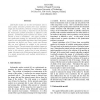Free Online Productivity Tools
i2Speak
i2Symbol
i2OCR
iTex2Img
iWeb2Print
iWeb2Shot
i2Type
iPdf2Split
iPdf2Merge
i2Bopomofo
i2Arabic
i2Style
i2Image
i2PDF
iLatex2Rtf
Sci2ools
115
Voted
ICIAP
2001
Springer
2001
Springer
Global Optimization of Deformable Surface Meshes Based on Genetic Algorithms
Deformable models are by their formulation able to solve surface extraction problem from noisy volumetric image data encountered commonly in medical image analysis. However, this ability is shadowed by the fact that the minimization problem formulated is difficult to solve globally. Constrained global solutions are needed, if the amount of noise is substantial. This paper presents a new optimization strategy for deformable surface meshes based on real coded genetic algorithms. Real coded genetic algorithms are favored over binary coded ones because they can more efficiently be adapted to the particular problem domain. The experiments with synthetic images are performed. These demonstrate that the applied deformable model is able extract a surface from a noisy volumetric image. Also superiority of the proposed approach compared to a greedy minimization with multiple initializations is demonstrated.
Coded Genetic Algorithms | Deformable Surface Meshes | ICIAP 2001 | Image Processing | Noisy Volumetric Image |
Related Content
| Added | 08 Dec 2009 |
| Updated | 08 Dec 2009 |
| Type | Conference |
| Year | 2001 |
| Where | ICIAP |
| Authors | Jussi Tohka |
Comments (0)

